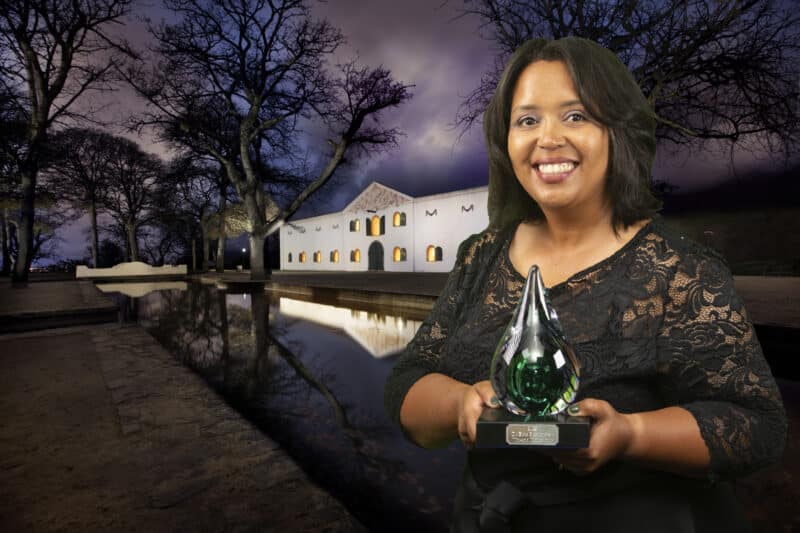Dr Erna Blancquaert – recipient of the 1659 Wine Advancement Award
Being born and bred in Paarl means you’re surrounded by vineyards; it would be difficult not to be curious about the vines themselves and the wines they produce. This is precisely what piqued Erna Blancquaert’s interest; growing up, she was fascinated by how it’s possible to smell fruits such as guava and cherry, or even the scent of tobacco in wine, if these weren’t present in the grapes.
Her interest was furthered thanks to love of the sciences – biology, chemistry and mathematics. ‘These subjects are the basis for life and very much needed in order to have an understanding of how things work.’ Although her academic success in these subjects offered her many career options; medical doctor and psychology being two, her choice was to study Viticulture and Oenology at Stellenbosch University, the first member of her family to do so. Erna is now a lecturer in Grapevine and Wine Sciences at her Alma Mater.
Her dreams didn’t end there. Due to her mantra that dreams are there to be pursued and achieved, none are impossible, Erna went on to be the first black woman to receive a PhD in Viticulture. Her thesis focused on the effect of light (UV light and light in the visible light spectrum) and temperature on the tannins in grape seeds and skins of cabernet sauvignon.
Then there are the Scholarships which allow Erna to further her studies, the most recent Taylor’s Port Golden Vines Diversity Scholarship in 2021, which she received as one of only two recipients from 42 entries. This has enabled her to undertake the taxing Master of Wine course. ‘Definitely one of the hardest things I’ve ever done, even harder than my PhD as you have to be up-to-date with what’s going on in the global wine world.’
Erna’s academic record is complemented by her desire for greater empowerment and transformation, which she describes as not only about race and gender but representation from a wide spectrum of groups encompassing age, race, ethnicity, ability and disability, religion, culture and sexual orientation.
She has firm views on changing mind sets and addressing prejudice. ‘We can only change mind sets through education and sharing of knowledge. I am fortunate as I am in academia, harnessing the skills of the next generation viticulturists and winemakers and also working with stakeholders, who are receptive of the knowledge which we generate, and implementing it. The transfer of knowledge is critical to build and transform the South African Wine Industry.’

If there’s one area where greater diversity would benefit the wine industry it would be viticulture; it is more common to find females in the cellar making wine than in the vineyard, tending vines. ‘There’s a very skewed view of the wine industry,’ Erna sighs. ‘The perception is that you drink exquisite wines all day. It takes a lot of passion, patience and love to be in this industry. A number highly successful and diverse graduates from Stellenbosch are working in the industry. Logan Jooste, Oursula Linee and Sherwin Van Wyk to name a few.Viticulture isn’t very popular but great wines are made in the vineyard; the viticulturist works with mother nature and needs to adapt sometimes at short notice to ensure a good, healthy crop.’
If her working life isn’t busy enough, Erna is a member of various industry bodies, serves on scientific journal review panels and, internationally she is South African leader of the European-funded VitaGlobal project with world-wide university wine faculties. They are currently finalising the development of an open online course for viticulture with universities in France, Argentina and Uruguay; this course will benefit viticulture knowledge in South Africa.
When she at last has time to relax with a glass of wine, Erna appreciates a good cabernet sauvignon, pinot noir and chenin blanc.
Blog by Angela Lloyd